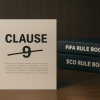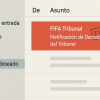Renuncia injustificada (TAS) Se puede sancionar al jugador por un mínimo de cuatro meses
Renuncia injustificada (TAS) Se puede sancionar al jugador por un mínimo de cuatro meses

1 / 1
El jugador alega que la FIFA DRC debería haber utilizado su discreción para exonerarlo de cualquier sanción, y que sufre un trato desigual en comparación con otros casos, dada su falta de condenas previas y su buena fe. … FIFA sostiene que [la sanción] está bien fundamentada, y que la FIFA DRC ejerce solo una discreción limitada al imponer sanciones mínimas y/o estándar …
Este es contenido exclusivo para usuarios registrados
Debes iniciar sesión o registrar una cuenta para ver este contenido.
Ver sentenciaEl artículo 17(3) del RSTP de FIFA dice en su parte relevante lo siguiente: “Además de la obligación de pagar compensación, también se impondrán sanciones deportivas a cualquier jugador que se encuentre en violación de contrato durante el período protegido. Esta sanción será una restricción de cuatro meses para jugar en partidos oficiales. En caso de circunstancias agravantes, la restricción durará seis meses”.
El Panel opina que la primera pregunta planteada por este texto es la posibilidad de que la FIFA DRC no aplique automáticamente una sanción según el artículo 17(3) del RSTP de FIFA, y la existencia de una discreción para la FIFA DRC de evaluar las circunstancias particulares y específicas en cada caso. En ese sentido, el jugador cita dos casos recientes donde la FIFA DRC exoneró a un jugador de cualquier sanción, mientras que FIFA niega la existencia de una práctica consistente al respecto. Considera que los casos citados son aislados y señala que uno de ellos es objeto de una apelación ante el CAS (Decisión de la FIFA DRC FPSD 7878; Decisión de la FIFA DRC FPSD 6827 y CAS 2023/A/95953).
El Panel nota que varios paneles del CAS han considerado que la interpretación literal de esta disposición implica el deber (y no solo la posibilidad) de que la FIFA DRC imponga sanciones deportivas a un jugador que ha incumplido su contrato durante el período protegido. Sin embargo, otros paneles, en línea con el Comentario al RSTP de FIFA, reconocieron la existencia de un enfoque flexible caso por caso, permitiendo a la FIFA DRC un cierto margen de discreción. A pesar de estas divergencias, la línea constante es que, como mínimo, se requieren argumentos claros y circunstancias específicas para apartarse de esta disposición (CAS 2014/A/3574; CAS 2015/A/3953 & 3954, párrafo 54, y las referencias; CAS 2021/A/7851 & 7905, párrafo 114; Comentario al RSTP de FIFA, edición 2021, ad Artículo 17, p. 178, y las referencias).
El Panel considera que, in casu, el Jugador no logró demostrar la existencia de circunstancias específicas que le permitieran escapar de cualquier sanción. Como se explicó anteriormente (§ 131 ff), el Jugador terminó el Contrato con Olimpija sin justa causa menos de ocho meses después de firmarlo, durante el período protegido. Al día siguiente de la terminación, firmó un nuevo contrato con el Primero Köln, mostrando falta de respeto por los principios de estabilidad contractual y pacta sunt servanda. Este recurso resultó en una orden de terminación el 1 de noviembre de 2023.
El Panel entiende, en una segunda etapa, que puede no tener discreción para ir por debajo de la sanción mínima de cuatro meses prevista en el artículo 17(3) del RSTP de FIFA. Considera que tal enfoque no es irrazonable y señala que ha sido respaldado en la jurisprudencia del CAS:
…
“En lo que respecta a la naturaleza y la extensión de la sanción infligida, el Panel no ve cómo puede aplicar el principio de proporcionalidad, mientras sea parte de las reglas codificadas del juego de la asociación en cuestión. Correspondería a uno o más miembros de esta asociación, o a la propia asociación (o a sus departamentos), cambiar tal regla si se considerase demasiado severa o que le falta la posibilidad de una aplicación matizada. En otras palabras, el Panel no puede reemplazar al legislador en la aplicación de la regla en cuestión”.
Además, el Panel concuerda con otros paneles del CAS que una sanción impuesta en primera instancia no se reducirá si de cualquier manera parece justificada (CAS 2019/A/6337, párrs. 115ff; CAS 2019/A/6463, párr. 152; CAS 2020/A/6796, párrs. 136 y 161; CAS 2021/A/7851 & 7905, párrs. 137-138). Sin duda, este es el caso aquí, dadas las circunstancias específicas previamente mencionadas. Por las mismas razones, las alegaciones de trato desigual presentadas por el Jugador se quedan cortas, especialmente ya que la FIFA DRC ha impuesto sanciones en muchos casos similares (véase, por ejemplo, Decisión de la FIFA DRC FPSD-627; Decisión de la FIFA DRC FPSD-7693; Decisión de la FIFA DRC Ref 19-00348; Decisión de la FIFA DRC Ref 1502022; Decisión de la FIFA DRC del 4 de agosto de 2022).
En consecuencia, el Panel se satisface al confirmar la sanción impuesta al Jugador en la Decisión Apelada.
173. The Player alleges that FIFA DRC should have used its discretion to exonerate him from any sanction, and that he suffers from unequal treatment compared to other case law, given his lack of previous condemnation and good faith. His reasoning is endorsed and reproduced almost word for word by Köln.
174. FIFA contends that this measure is well-grounded, and that the FIFA DRC exercises only a limited discretion when imposing minimum and/or standard sanctions. Olimpija essentially defers to FIFA’s assessment.
175. Article 17(3) of the FIFA RSTP reads in its relevant part as follows: “In addition to the obligation to pay compensation, sporting sanctions shall also be imposed on any player found to be in breach of contract during the protected period. This sanction shall be a four-month restriction on playing in official matches. In the case of aggravating circumstances, the restriction shall last six months”.
176. The Panel is of the opinion that the first question raised by this text is the possibility for the FIFA DRC not to apply automatically a sanction as per Article 17(3) of the FIFA RSTP, and the existence of a discretion for the FIFA DRC to evaluate the particular and specific circumstances on a case-by-case basis. In that respect, the Player quotes two recent cases where the FIFA DRC exonerated a player from any sanction, whereas FIFA denies the existence of a consistent practice in this regard. It considers the cases cited to be isolated, and points out that one of them is the subject of an appeal to CAS (FIFA DRC Decision FPSD 7878; FIFA DRC Decision FPSD 6827 and CAS 2023/A/95953).
177. The Panel notes that several CAS panels have considered that the literal interpretation of this provision implies the duty (and not just the possibility) for the FIFA DRC to impose sporting sanctions on a player who has breached his contract during the protected period. However, other panels, in line with the FIFA RSTP Commentary, recognised the existence of a flexible case-by-case approach, allowing the FIFA DRC a certain margin of discretion. Despite these divergences, the constant line is that, at the very least, clear arguments and specific circumstances are required to depart from this provision (CAS 2014/A/3574; CAS 2015/A/3953 & 3954, para 54, and the references; CAS 2021/A/7851 & 7905, para 114; FIFA RSTP Commentary, 2021 edition, ad Article 17, p. 178, and the references).
178. The Panel considers that, in casu, the Player failed to demonstrate the existence of specific circumstances allowing him to escape any sanction. As explained above (§ 131 ff), the Player terminated the Olimpija Contract without just cause less than eight months after signing it, during the protected period. On the very next day following the termination, he signed a new contract with First Köln, showing disrespect for the principles of contractual stability and pacta sunt servanda. 3 This appeal resulted in a termination order on 1 November 2023.
179. The Panel understands, in a second stage, that it may have no discretion to go below the minimum four-month sanction provided for in Article 17(3) of the FIFA RSTP. It finds that such approach is not unreasonable and notes that it has been supported in CAS jurisprudence: …
“Concerning the nature and the extent of the inflicted sanction, the Panel does not see how it can apply the principle of proportionality, as long as it is part of the codified rules of the game of the association concerned. It would be up to one or more members of this association, or to the association itself (or to its departments), to change such a rule should it be considered as too severe or lack the possibility of a nuanced application. In other words, the Panel cannot replace the legislator in the application of the rule in question”.
180. In addition, the Panel concurs with other CAS panels that a sanction imposed at first instance shall not be reduced if it appears in any case justified (CAS 2019/A/6337, paras 115ff; CAS 2019/A/6463, para 152; CAS 2020/A/6796, paras 136 and 161; CAS 2021/A/7851 & 7905, paras 137-138). Yet, this is undoubtedly the case here, given the specific circumstances previously mentioned. For the same reasons, the allegations of unequal treatment put forward by the Player fall short, especially since the FIFA DRC has imposed sanctions in many similar cases (see e.g. FIFA DRC Decision FPSD-627; FIFA DRC Decision FPSD-7693; FIFA DRC Decision Ref 19-00348; FIFA DRC Decision Ref 1502022; FIFA DRC Decision of 4 August 2022).
181. Consequently, the Panel is satisfied to confirm the sanction imposed on the Player in the Appealed Decision.
Para ver decisión original presiona el siguiente link: CAS 2023/A/9578, 2023/A/9579 & 2023/A/9580, 21 de diciembre de 2023
CAS 2023/A/9578 NK Olimpija Ljubljana v. Jaka Cuber Potonik and .1 FC Köln
CAS 2023/A/9579 1. FC Köln GmbH & Co. KGaA & 1. Fußball-Club Köln 01/07 e.V.
v. NK Olimpija Ljubljana & FIFA
CAS 2023/A/9580 Jaka Cuber Potonik v. NK Olimpija Ljubljana &FIFA
Identificación
8902
Publicado
diciembre 21, 2023
Vistas:
368
Más de este usuario
Te puede gustar
Copyright © 2024 JurisDeportiva . Todos los derechos reservados.


























